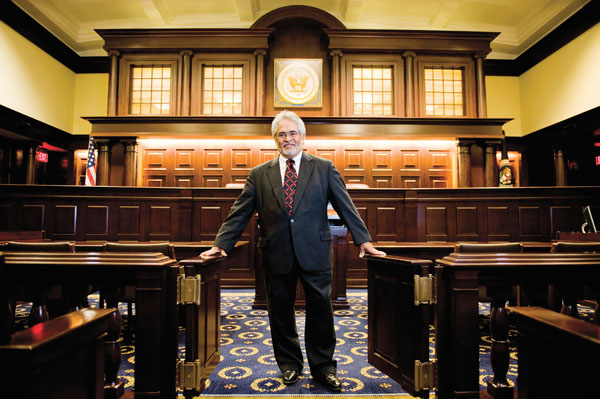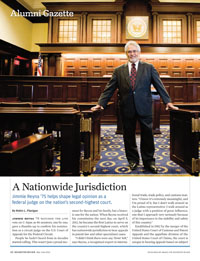Alumni Gazette
 EXPERT OPINION: An expert on international trade law, Reyna is a member of the U.S. court that hears appeals based on patent
disputes, trade agreements, and international issues. (Photo: Kevin Wolf/AP Images for Rochester Review)
EXPERT OPINION: An expert on international trade law, Reyna is a member of the U.S. court that hears appeals based on patent
disputes, trade agreements, and international issues. (Photo: Kevin Wolf/AP Images for Rochester Review)Jimmie Reyna ’75 watched the live vote on C-Span as 86 senators, one by one, gave a thumbs-up to confirm his nomination as a circuit judge on the U.S. Court of Appeals for the Federal Circuit.
People he hadn’t heard from in decades started calling. This wasn’t just a proud moment for Reyna and his family, but a historic one for the nation. When Reyna received his commission the next day, on April 5, 2011, he became the first Latino to serve on the country’s second-highest court, which has nationwide jurisdiction to hear appeals in patent law and other specialized cases.
“I didn’t think there were any ‘firsts’ left,” says Reyna, a recognized expert in international trade, trade policy, and customs matters. “I know it’s extremely meaningful, and I’m proud of it, but I don’t walk around as the Latino representative. I walk around as a judge with a position of great influence, one that I approach very seriously because of its importance in the stability and safety of this country.”
Established in 1982 by the merger of the United States Court of Customs and Patent Appeals and the appellate division of the United States Court of Claims, the court is unique in hearing appeals based on subject matter and type of law rather than on the basis of the federal district in which cases may have arisen. Given its federal jurisdiction, the court’s decisions can be appealed only to the U.S. Supreme Court.
Located in Washington, D.C., the court has 12 active judges, who typically consider cases in panels of three. Nominated for the court by the president, judges are confirmed by the Senate.
Reyna remembers the moment, in the summer of 2010, when the Department of Justice called to announce that President Barack Obama had green-lighted his nomination process. Driving at the time from his home in Silver Spring, Md., to Delaware for vacation with his wife, Dolores ’75, and one of their sons, he pulled onto a dirt road to hear the details. Despite the day’s scorching temperature, Reyna got out of the car and leaned his forearms on the car’s hot hood as he listened.
“I was frying and didn’t even feel it because of the excitement,” he recalls. “I hung up, and everyone’s staring from the air- conditioned car. I turned around and started running down that dirt road, and then I came running back, hands pumping. By the time I got back in the car, they knew what had happened.”
Reyna’s fascination with international relations grew out of his modest upbringing in Clovis, N.M. The son of Baptist missionaries who regularly drove with their five children to Mexico to visit relatives, he was raised to understand that both countries have a common history and overlapping interests. He was in junior high school when he felt the pull to be a lawyer, and he began his litigation career in Albuquerque, where he handled domestic relations, civil rights, tort, and criminal defense matters, many of which were pro bono cases.
After moving his family to Maryland in search of specialized care facilities for his eldest son, who has autism, he began building a career in international trade law, one that led him to write books on the subject and to serve on panels that decided international trade disputes.
“What makes him unique is that he has a strong perseverance, and he has become an expert on matters of international trade through his diligence and hard work,” says Roman Hernandez, an attorney in Portland, Ore., who met Reyna through the Hispanic National Bar Association in 2003. “He learned that area of the law, mastered it, and became a well-regarded expert—and this was before he joined the court. I have a deep respect for him.”
President of the Hispanic National Bar Association from 2006 to 2007, Reyna helped create a program to instill confidence and trust in the U.S. legal system, founded the association’s Journal of Law, and worked with the National Hispanic Leadership Agenda, an umbrella organization serving 30 national Latino organizations. As a leader in the American Bar Association, he served on the Presidential Commission on Diversity in the Legal Profession, helped launch and direct the U.S.-Mexico Law Institute, and was a leader in the association’s Section on International Law.
Reyna says being a history major at Rochester prepared him to turn raw information into valuable research, a critical skill in his current job. He used to study with other students at the home of former history professor Winthrop Hudson, where he would read and sip hot chocolate by the fireplace. “That practicum was definitely a turning point in my education,” he says.
Despite a distinguished career that has earned him wide recognition—in 2009, he received the Ohtli Award, the Mexican government’s highest honor bestowed to a foreigner, for his contributions to the Hispanic community—Reyna has maintained an enthusiastic awe for his role as a federal judge and for what the position represents in the legal system.
“I come to work every day with a great sense of excitement and honor and privilege to be doing what I’m doing,” he says. “It’s just wonderful.”
Robin L. Flanigan is a Rochester-based freelance writer.

